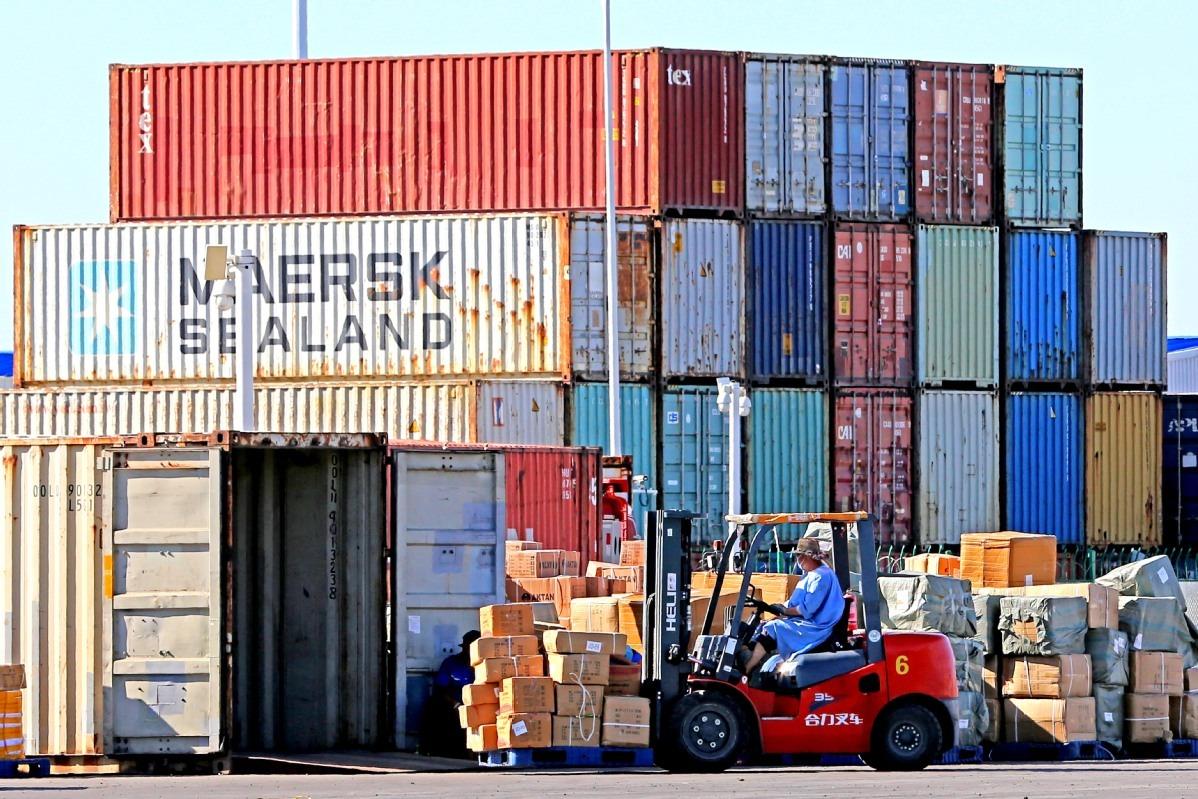Imports, exports expected to be major economic pillar in 2024, report says
 A worker transports cargo with a forklift at the Urumqi International Land Port Area in the Xinjiang Uygur autonomous region in July. (CAI ZENGLE / FOR CHINA DAILY)
A worker transports cargo with a forklift at the Urumqi International Land Port Area in the Xinjiang Uygur autonomous region in July. (CAI ZENGLE / FOR CHINA DAILY)
More targeted policies and business potential are expected for the China (Xinjiang) Pilot Free Trade Zone this year, to boost foreign trade in the Xinjiang Uygur autonomous region.
The regional government expects to make the FTZ a hub for reform and opening-up, where major projects and leading companies are introduced, and innovative measures taken in facilitating investment and trade, Erkin Tuniyaz, chairman of the regional government, said when delivering the government work report at the opening ceremony of the second session of 14th Xinjiang People's Congress on Tuesday.
The three subzones in Kashgar prefecture, Urumqi and Horgos will implement half of the 129 pilot reforms planned for this year, according to the report.
Xinjiang borders eight countries including Russia, Kazakhstan, Tajikistan and Pakistan, and has the longest borders and most land ports in China.
The FTZ, established on Nov 1 last year and covering almost 180 square kilometers, has become a driving force to boost China's opening-up to Central Asia, West Asia and South Asia.
Since the unveiling of the Kashgar subzone on Nov 11, a total of 86 companies have registered with an investment of more than 12.59 billion yuan ($1.75 billion), according to Dong Youhua, deputy director of the development and reform commission of Kashgar prefecture, who is also a deputy to the congress.
A series of innovative modes of operation are underway. Cargo inspected at Kashgar Customs will be able to pass Turgart port directly to avoid a second inspection and improve logistics efficiency from February.
Xinjiang's first one-stop exported vehicle industrial park opened in Kashgar on Jan 3. An industrial park built for Kyrgyzstani companies was established in Kashgar. The prefecture also opened cargo flights to Moscow, according to Dong.
Li Yang, deputy general manager of Xinjiang Changxin Electronic Technology, a lighting equipment producer, said the FTZ has helped promote its foreign trade in many ways.
"Before that, we transported goods ourselves. Now we can share the same truck with other companies under the arrangement of the government, so that the logistics cost can be reduced," he said.
The government also helped the company build an overseas warehouse in Kazakhstan in December, so that customers can receive their goods faster at lower prices.
He added the government will also organize trips for companies to visit foreign countries, in which he hopes to participate, so that the company can better know clients' needs.
Rayhangul Sudan, Party secretary of Kashgar Construction Engineering and a deputy to the congress, said Kashgar's fame increased significantly after the establishment of the FTZ, and many companies came to invest.
The group's Hualing international trade market, which is located in the subzone, has attracted about 300 companies, including world-renowned brands. "I've learned that Xinjiang's economy develops very fast. I'm fully confident for the future," she said.
Kashgar's foreign trade surged 71.2 percent to reach 83.6 billion yuan last year, contributing 23.4 percent to regional foreign trade, data from Kashgar Customs showed.
Contact the writers at chenmeiling@chinadaily.com.cn


